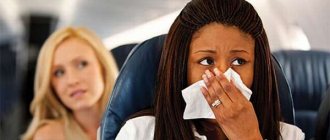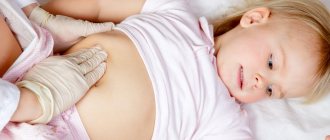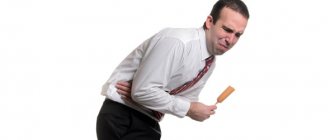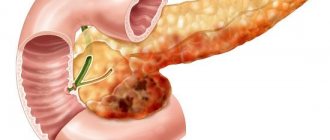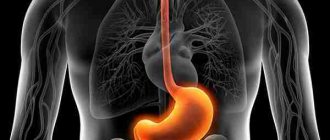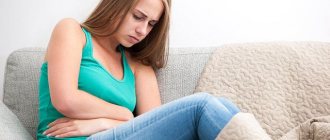Author, editor and medical expert - Klimovich Elina Valerievna.
Number of views: 503 254
Last update date: 18.02.2021
Average reading time: 14 minutes
Diarrhea is one of the most common pathological symptoms, occurring both in isolation and in combination with other manifestations of various diseases2. About 1.7 billion cases are reported worldwide every year2. Most often they are associated with infections and poisoning2, in which diarrhea is usually accompanied by abdominal pain and symptoms of intoxication. However, these same symptoms also occur in other diseases.
Up to contents
Types of diarrhea, causes
Indigestion may be accompanied by loose stools, abdominal discomfort, and a person's stomach turns. Based on the cause of its occurrence, diarrhea is divided into infectious and non-infectious. According to the form: acute and chronic. Before treatment, it is necessary to determine the diagnosis and establish the cause of diarrhea.
To make a diagnosis and identify the source causing loose stools, it is recommended to undergo a medical examination and laboratory tests. OBC, stool analysis, endoscopy, ultrasound, abdominal x-ray - these studies will help accurately diagnose the disease and apply appropriate treatment.
Factors that can provoke diarrhea are:
- Viruses, pathogenic microorganisms;
- Allergy to medications, food additives;
- Spoiled food, poor quality products;
- Psycho-emotional disorders;
- Hormonal imbalance, pregnancy;
- Gastritis;
- Ulcerative colitis;
- Appendicitis (acute pain in the lower abdomen);
- Inflammatory processes of the abdominal organs (cholecystitis, pancreatitis);
- Side effect on medications;
- Traveler's diarrhea and stomach malfunction are provoked by climate change and an unusual diet;
- Previous operations on the gastrointestinal tract.
Common causes are food poisoning and intestinal infections. Each case requires an individual approach to treatment. For example, in case of poisoning, diarrhea cannot be stopped. The body removes toxic compounds through loose stool. For viral etiologies, treatment with antibiotics is recommended.
Abdominal pain without diarrhea indicates a malfunction of the stomach. If your health does not improve, the pain becomes more intense, it is necessary to urgently find out the cause.
The first rule of a quick recovery is to find out the cause and eliminate it correctly.
Inflammation of the gastric mucosa and abdominal pain after eating
Inflammation of the tissues of the mucous membrane of the stomach or duodenum. Pain during inflammatory processes in the area of these parts of the digestive system indicates a person has gastroduodenitis. It is the source of severe and prolonged periodic colic in the lower abdomen, mainly on the left/right side, occurring immediately after filling the stomach with food and sometimes accompanied by belching. Periodically, unpleasant sensations are localized in the navel area.
Symptoms
Symptoms of diarrhea can occur at any time, in men, women, and children.
A person suffering from diarrhea may complain of sharp pain with abdominal cramps and general weakness. As the disease progresses, symptoms appear:
- Cravings in the stomach;
- Nausea;
- Frequent urge to go to the toilet;
- Vomit;
- Heat;
- Pulling in the lower abdomen;
- Dry mouth;
- Drowsiness, apathy;
- Severe dizziness, etc.
If you have diarrhea, monitor the patient’s well-being and condition. If you suspect signs of dehydration, it is recommended to contact an ambulance.
Causes and features of pain syndrome
If the stomach hurts, the patient is able to show the most pronounced place on himself. The stomach is projected onto the body in the epigastric zone - a special area in which the upper part of the abdomen is located, located between the ribs.
The manifestations of intestinal pain depend on the area involved: near the navel, the small intestine mainly causes concern, on the right and left in the lateral sections - loops of the large intestine, on the right in the groin area - the appendicular process and the cecum, on the left - the rectum and sigmoid colon.
An atypical location will not be understood. The main thing is that the patient knows about the need to accurately indicate the source of pain.
When the stomach turns and diarrhea, this may indicate an organic or functional lesion of the digestive tract. Functional are caused by defects in the contraction function of the muscle apparatus when the signal coming from the brain is disrupted. Any organic causes are due to some disease.
Treatment options
To get rid of the symptom in a short time, you need to consult a doctor. Based on the diagnosis, a course of treatment is prescribed. As a rule, medications and traditional methods of treatment are used, and a diet is recommended for the first time. The list of medications is different for an adult and a child.
To combat abdominal pain and diarrhea, medications are used:
- Sorbents. The drugs absorb harmful substances and are eliminated from the body naturally. The absorbing effect of certain types of sorbents is aimed exclusively at toxic compounds; they do not remove beneficial bacteria and do not disrupt the intestinal microflora. Activated carbon, Enterosgel, Smecta, Polysorb - sorbents cope with signs of intoxication, help eliminate diarrhea and abdominal pain. The use of drugs is permitted in childhood from birth, during pregnancy and lactation.
- Antimicrobial agents. Enterofuril is an intestinal antiseptic, prescribed for the treatment of diarrhea in adults and children. Available in the form of a suspension or capsules. Allowed for infants over 1 month, pregnant women, nursing mothers. The advantage of using the medicine is that it does not injure the mucous membrane; the medicine does not disturb the microflora of the stomach.
- Rehydration drugs. With diarrhea, excess fluid is removed from the body, which leads to the leaching of beneficial microelements, disrupts the water-salt balance, and is dangerous due to dehydration. A child with diarrhea is susceptible to rapid fluid loss. To replenish fluid, it is recommended to drink enough water and take medications that retain moisture in the body. These are Regidron, Gidrovit, Humana Electrolyte. If the first aid kit does not contain the indicated products, it is possible to replace it with saline solution or salted water.
- Anti-inflammatory drugs. If diarrhea is infectious, antibiotics are prescribed. Pathogenic microorganisms can spread viruses and bacteria in the intestines. Galavit is a drug that copes with diarrhea of viral origin. For children over 6 years of age, it is allowed to be used for therapy.
- Probiotics. Along with loose stools, useful substances are removed from the body. The intestinal microflora is disrupted. When taking antibiotics, probiotics are always prescribed to restore digestion. Linex, Bifidumbacterin, Biogaia, Enterozermina, Bifiform, Normobakt, etc.
- Antipyretic. High fever during diarrhea must be brought down. Take Ibufen, Aspirin, Paracetamol when the temperature rises.
- Stool strengthening agents. Only a doctor has the right to prescribe drugs that strengthen the stool. In some cases, this is strictly prohibited. For example, in case of poisoning, intestinal infections. For diarrhea, Loperamide (Imodium) is used to regulate stool. Women have contraindications for use during pregnancy and lactation.
- Remedies for bloating. If you have an upset stomach, in addition to pain and discomfort in the abdomen, a person may experience severe boiling, bloating, and increased gas formation. To eliminate these symptoms, Espumisan is prescribed.
Traditional methods
After consulting with a doctor, it is permissible to try traditional methods of dealing with loose stools. A list of ways to help cope with symptoms at home:
- Rice. Rice porridge with water or a decoction is used to eliminate diarrhea in adults and children. Rice water is prepared for children. The product is given to drink before meals. On the third day the diarrhea goes away.
- Starch. If your stomach is cramped, you can prepare potato broth. Boil a couple of medium potatoes. The broth after cooking contains starch. Take 100 ml of decoction throughout the day. The second method: dilute a teaspoon of starch in a glass of water and drink before meals.
- Pomegranate. Pomegranate peels are used in folk medicine to treat diarrhea. Peel the fruit, remove the white film from the peels, and dry a little. Steam in a thermos for several hours. Strain the broth. Take before meals.
- Tea. Strong tea is used in the treatment of indigestion. Brew 2 teaspoons per glass of boiling water, drink three times a day.
If you have diarrhea without fever and your stomach periodically cramps, decoctions from medicinal plants will help cope with the symptom. Traditional methods are effective when used correctly. Natural ingredients are harmless to health.
Diet for diarrhea
Proper nutrition and a dietary table are a prerequisite for the patient’s rapid recovery after diarrhea. If your stomach hurts, it is recommended to refrain from eating for the first day so as not to burden your stomach. Then eat small portions, 5-6 times a day.
It is allowed to include in the menu: porridge with water, lean broths, vegetable soups, steamed cutlets, crackers, dried fruit compotes, herbal tea.
As the patient's condition improves, new products are added to the menu.
Do not consume during diarrhea:
- Sparkling water;
- Alcoholic drinks;
- Peas, beans, lentils;
- Dairy products;
- Fruits vegetables;
- Bakery products;
- Coffee drinks.
If you follow the correct diet, the stomach will recover from diarrhea in a short time.
Toxic infection and lower abdominal pain, diarrhea, nausea and diarrhea
Why does colic appear and diarrhea begin in case of poisoning (toxic infection)? The vast majority of known examples of poisoning occur due to the consumption of low-quality or expired food. This often happens due to negligence, and sometimes as a result of neglect of hygiene rules. Through loose stools and lightheadedness, nausea and vomiting, the body naturally tries to get rid of the detected toxins and other poisonous substances that have penetrated the stomach and intestines after using low-quality products.
Diarrhea, pain in the organs of the digestive system and signs of nausea torment the patient because, as a result of digestion, the components of poor-quality food are absorbed into the blood, thereby poisoning the body. Obvious symptoms of poisoning are nausea and vomiting, general weakness, drowsiness, fever, and less commonly, changes in body temperature, and impaired bowel movements. In case of severe poisoning, toxic shock may occur, accompanied by a decrease in blood pressure. Under its influence, a person’s heart rate may increase and confusion may occur.
What not to do if you have diarrhea
Every person has experienced diarrhea. Both children and adults are susceptible to stomach upsets caused by certain factors. Many people do not pay much attention to loose stools. But diarrhea can be a signal of serious health problems. If you have diarrhea, you should not:
- Start treatment yourself, especially with medications, if a case of poisoning or infection occurs.
- Apply a warm towel or heating pad to your stomach. It is believed that heat helps to reduce cramping in the abdomen and reduces cramping pain. Without knowing the exact cause of diarrhea, it is easy to make the situation worse.
- Eat foods that have a laxative effect on the stomach.
- Do not eat foods that irritate the intestines.
If the patient's condition worsens, it is recommended to call a doctor.
Salmonellosis and frequent loose stools, nausea and abdominal pain
Salmonellosis is a disease belonging to intestinal infections. The source of its occurrence is pathogenic microorganisms, bacteria and viruses that enter the human body through the gastrointestinal tract. It is inappropriate to draw analogies between the deterioration of stool that occurs with food poisoning and intestinal infections. In the second case, the problem is hidden in the effects of viruses and harmful bacteria on the body, while in the first it is associated with food consumption. Salmonellosis has a long incubation period; its symptoms do not appear immediately, but only some time after the onset of the disease.
Prevention
It is better to prevent a disease than to treat it. Some tips to prevent diarrhea:
- Maintain good personal hygiene and wash your hands before eating.
- Wash vegetables and fruits thoroughly.
- Avoid contact with sick people. If a family member is sick, prepare separate dishes.
- Spend more time outdoors.
- Maintain proper nutrition at all times.
- Lead an active lifestyle.
When the first symptoms appear, do not let the disease take its course, consult a doctor. This will help reduce treatment time and restore health.
